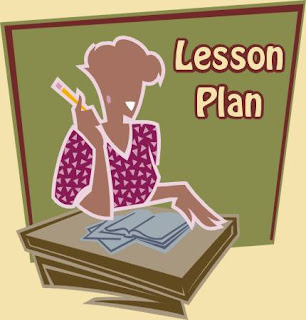
So if you enjoyed last week’s installment on Setting Up Your Classroom (or if it filled you with fear, trembling, and/or annoyance), you’ll love this week’s on Planning Your First Lessons! Since you may be teaching a different age group or subject from myself, I’m going to keep this post pretty general.
Blogger Mr. Accountable Talk (if you’re not reading his blog, you should be) reminded me that any advice to new teachers about those first heady days with the kids should be tempered with a strong dose of You Are Not Their Friend. This is so, so true. Particularly if you are teaching in a touchy-feely new school, there will be a lot of talk tossed around about “relationships” with the kids, and this may make you think you are supposed to develop a relationship with them first. I do not agree. Planning your first lessons with a sense of purpose, order, and firmness, though, will enable you to set up relationships with the kiddies that have healthy boundaries of respect around the compassion and, dare I say it, affection you will and probably should develop for your charges.
So when you plan your first lessons, make like Gary Rubinstein in The Reluctant Disciplinarian (a book you should read if you haven’t) and Keep It Simple. Your ed-school/NYCTF/TfA/cereal box training will have taught you all kinds of wonderful things about constructivism and Bloom’s taxonomy and multiple intelligences and blah blah blah. These are fine and, indeed, crucial things to know, especially when you are hoping to impress your boss. But for the first couple of weeks, Keep It Simple. You are learning yourself, after all. Do NOT plan intricate group projects, for example, during this time period. You may think you are promoting teamwork and higher-order thinking and whatnot. You will probably only inspire disaster.
The first couple of weeks of school should, first and foremost, be for promoting a sense of discipline and order in your classroom. This does not mean screaming at the kids, threatening them, intimidating them, or the like. It means projecting an aura of slightly blasé calm and control such that the students will think you have done this a million times before. You can best do this by following some very simple tips:
· Dress professionally. I don’t care how hot it is. Kids will definitely respect you more if you spend at least the first month of school looking sharp.
· Don’t raise your voice.
· Ask very few questions.
· If you don’t know what you’re supposed to do at a particular moment, fake it with as much calm as you can. Do not ever let on that you are taking a lucky guess. If you turn out to be wrong, the kids will probably never know.
· Be prepared to answer any question in less than half a second with as few syllables as possible. (See Rubinstein’s book on how to do this. He’s kidding, sort of, but it’s a good thing to keep in the back of your head.)
· Keep the room tidy, and enlist the students’ help in doing so.
· Don’t smile or laugh too much, but don’t act like a robot, either. I never could follow the “Don’t Smile Till Christmas” rule; I’m a pleasant and lighthearted person by nature, and a smile at the right moment can be reassuring and comforting for a kid. Just remember that the more serious and unruffled you can be, the more they will respect you.
· Have a Plan B, Plan C, Plan D, and Plan E. Kids will always finish something too fast and take too long with something else. Always be, or at least seem, prepared to extend an activity or move on to the next thing.
If you are worried about appearing too authoritarian or “mean,” you probably shouldn’t be. You need to not seem too cuddly in the first few weeks at the very least. I know—I’m a terminally nice person with a strong desire to be liked and accepted at all times myself, and the first time I really took the advice above, I was terrified. Guess what? It was the best year of my (admittedly short) career. The kids and I were getting along famously inside of two weeks. They were under control and they knew my limits, but we had a lot of fun too. You can have fun with your kids, enjoy them, and still be a firm leader in your classroom. But be a firm leader first. The relationships will follow when kids feel like they trust you to do your first jobs, which are to keep them safe and teach them stuff.
How does this play out in lesson planning? Do a lot of assessment. Whatever your subject is, you’ll have to do it. It’s not just paperwork to keep your bosses happy; it will tell you stuff about your kids. The easiest writing assessment in the world is to tell kids to write about anything for a fixed period of time. The only rule is that they have to start when you tell them and not stop till you tell them. Seeing what and how they write without any other instruction is valuable indeed. And whatever else ever came out of the Teachers’ College Reading and Writing Project (hi, northbrooklyn!!!), their reading assessments are easy and useful, and your principal will understand them. You can give them interest inventories, assess their learning styles, give them fun getting-to-know-you questionnaires…but notice that this is all quiet, independent seatwork. Nothing fancy yet! No plays or dioramas or book clubs or whatever else yet. Remember, you’re still establishing the tone and your tone is all-business, no-nonsense.
Also, plan to spend time explicitly teaching the things you need to do to keep the classroom running efficiently. Teach your rules. I’m not a fan of making the rules up along with the kids, although some teachers do this very well. Keep your rules simple and short and unambiguous. Spell out your Ladder of Discipline (most schools have a buildingwide ladder), which is something like
1.) Warning
2.) Student-teacher conference
3.) Phone call/letter/e-mail home
4.) Student-teacher-parent conference
5.) Referral to principal/dean
Make clear your specific, personal triggers. There are a few swear words that make me ill, and I cannot abide anything being thrown. You will be surprised how, if you are honest about what truly drives you up a wall, considerate students will be of these things, if you have established yourself as a firm leader.
Teach things like how to get supplies in the classroom, how to enter and exit the room, how to start the class, how to end the class, how you like things passed out and collected, how and when students can leave their seats, etc. You have probably not thought about any of these things. Trust me when I say you have to, even for high school kids. The more clear, explicit, and detailed your expectations are, the more they will know how to follow them. You may think that it would have the opposite effect, that kids will roll their eyes and grumble. Please trust me when I say that kids generally do not like surprises. The more routine, the more disciplined, the more orderly you can make your classroom, the more they will enjoy being there. They will feel comfortable and safe, and at that point, they can focus on their work. Not until then.
So now you have an idea of how to start thinking about how to set up your classroom and how to shape your first couple of weeks of lessons. In my next posts, we’ll delve more deeply into the two major aspects of your first few weeks: Assessment and Discipline. That’s if, of course, you haven’t run screaming yet.
Enjoy the holiday weekend!
Love,
Miss Eyre





















